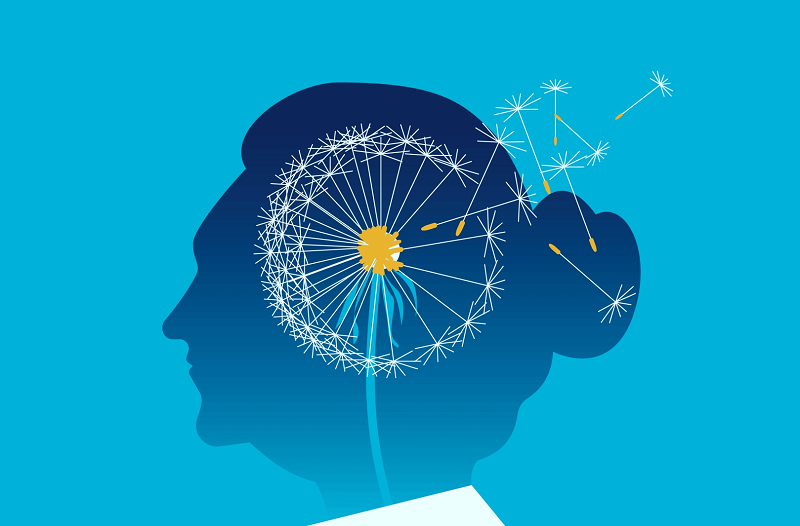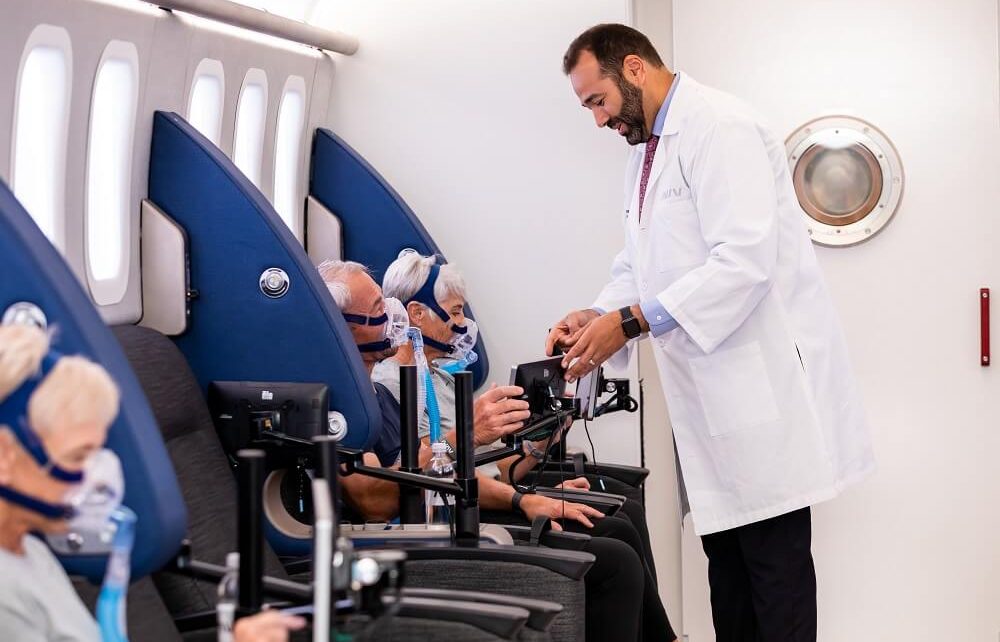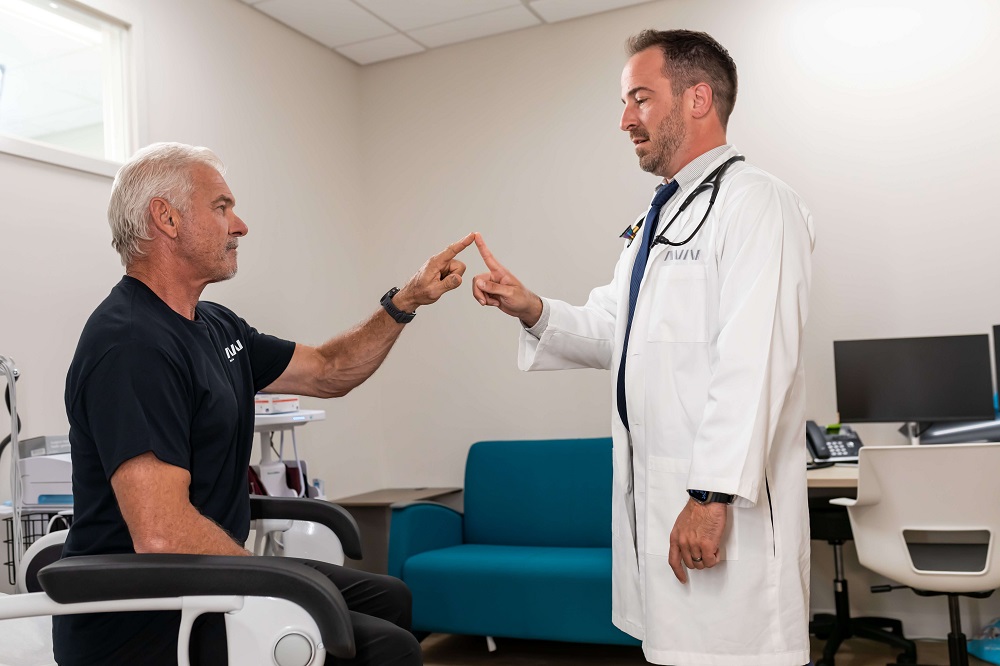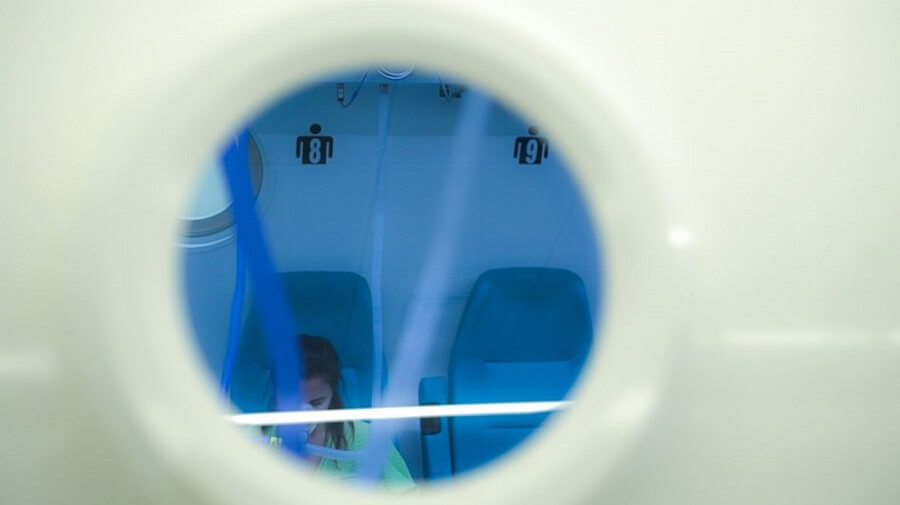Rising Temperatures and Brain Health:10 Ways to Stay Safe in the Heat
While most of us are aware of the summer risks of dehydration, heat exhaustion, and skin cancer, brain health often goes unnoticed as a negative side effect of our warming planet. Heat exposure can devastate the human brain and have potentially damaging long-term effects.
It is crucial to understand the effects of hot weather on the body and know how to protect oneself during the peak summer months. This article will explore some practical tips to help you stay safe in the heat.
With global temperatures increasing in recent years, avoiding extreme heat exposure and keeping cool during extreme high temperatures is more vital than ever. Taking the correct precautions, especially during unusually hot periods or heat waves, will reduce the risk of heat-related conditions including migraines, seizures, stroke, and some forms of dementia, including Alzheimer’s disease.
Following some essential but simple tips can protect brain health during the hot weather:
10 Ways to Stay Safe in the Heat
- Stay Hydrated – As temperatures soar, keeping your body hydrated is crucial. Drink plenty of water throughout the day, even if you don’t feel thirsty. Opt for water-rich foods like fruits and vegetables to replenish electrolytes and prevent dehydration.
- Dress Right – Wear light-colored, loose-fitting clothing made from breathable materials to stay cool in hot weather. Protect yourself from the sun by wearing a wide-brimmed hat and sunglasses with UV protection.
- Find the Shade – When the heat becomes intense, find shade to take a break from direct sunlight. Whether outdoors or indoors, staying in the shade helps lower your body temperature and reduces the risk of heat-related illnesses. Even carrying an umbrella on a sunny day can help beat the heat.
- Take it Easy Outdoors – During peak heat hours, typically between 10 a.m. and 4 p.m., try to avoid strenuous outdoor activities. If you need to exercise or work outside, do so during the cooler morning or evening hours when the sun is less harsh than mid-day.
- Cool Down Effectively – Use cooling methods like cool showers, damp towels, or fans to lower your body temperature. If you can’t cool down in an air-conditioned area, at least ensure you have a well-ventilated space to prevent overheating.
- Eat Healthy – Boost your brain’s function by eating healthy foods such as fruits, vegetables, whole grains, healthy fats, and lean proteins, like the foods found in the MIND diet. Foods rich in nutrients support brain health and may even prevent age-related cognitive decline.

- Brain Exercise – Stimulate your brain regularly with puzzles, games, or activities that require critical thinking and problem-solving. It’s important to keep your mind active to maintain cognitive function, especially during extreme heat.
- Be Prepared – You should take precautions and protect your brain health in extreme temperatures by planning ahead.
- Screen Time – Too much exposure to electronic devices like smartphones and computers isn’t good during extreme heat. Mental fatigue from excessive screen time may be exacerbated by heat and the effects of excessive screen time on your body.
- Sleep Well – Healthy brains require restful sleep. Create a cool and comfortable sleeping environment to ensure you get enough quality sleep during hot nights (and during the days if you are a napper).
Rising Temperatures and Brain Health
While everyone is aware of the potential consequences of rising temperatures on our ecosystem, many of us don’t recognize the impact extreme heat can have on our brain health. Understanding the risks associated with extreme heat and climate change is not only vital for preserving our planet but also for safeguarding our own overall health, including our brain health.
Aviv’s unique medical program combines hyperbaric oxygen therapy (HBOT) with cognitive training, fitness training, and nutrition coaching to help improve the quality of life for people interested in healthy aging and those wanting to keep their brains sharp for as long as possible.
Contact Aviv Clinics Dubai by DP World to learn more about the Aviv Medical Program and how it can help improve your cognitive and physical performance.
MIND Your Diet for Better Brain Health
Some people follow a specific diet to lose weight, while others follow a diet to lower blood pressure or improve heart health. However, there’s one diet that has the potential to provide all those benefits plus delay or reduce the onset of cognitive decline: The MIND diet.
The MIND diet is a dietary program specifically designed for Neurodegenerative delay. This was formed by blending 2 highly effective diets: the Mediterranean and Dietary Approaches to Stop Hypertension (DASH) diet.
The Mediterranean diet mainly focuses on a heart-healthy eating plan. The DASH diet aims to treat or prevent high blood pressure.
The MIND diet is different because it is designed to target brain health and reduce the risk of some neurological diseases such as dementia. The MIND diet encourages the consumption of a variety of foods that ultimately benefit both the nervous system and cognitive health.
At Aviv Clinics Dubai by DP World, our clinical team includes dietetic support for every client due to the important role of nutrition when it comes to cognitive and neurological health.

Essentials for the Brain
For optimal health, your brain needs specific nutrients such as
- Omega-3 fatty acids for strengthening brain cell structure
- Choline to help regulate memory, mood, and cognitive performance
- Flavonoids for regulating inflammation and improving blood flow
- Vitamin E for protection against inflammation
The MIND diet provides all of the above mentioned essential nutrients. The diet omits or limits foods with ingredients that could negatively impact the brain, like saturated fats and trans fats, which are believed to be responsible for increasing beta-amyloid protein levels in the brain. This protein accumulates in the brain and can disrupt communication between brain cells and ultimately lead to brain cell death.
Eating foods that contain these unhealthy fats have been associated with an increased risk of Alzheimer’s disease. Examples of foods containing unhealthy fats are red meats, processed foods, and fried foods.
Foods containing antioxidants and vitamins—like what’s suggested as part of the MIND diet—may prevent the formation of these beta-amyloid plaques in the brain. Plant-based foods also contain phytonutrients and antioxidants which is beneficial for overall health.
More than half of your brain is made up of omega-3 fats. Your body needs foods rich in omega-3 fats to provide the necessary protective anti-inflammatory benefits. Omega-3 foods includes
Healthy fats, known as polyunsaturated fats, found in fish oils, flax seed, walnuts, and cold-water fish for example, and monounsaturated fats, which have anti-inflammatory properties, obtained from eating avocado, nuts, and seeds, all provide the essential omega-3 fatty acids that are beneficial for optimal brain health.

How to Make the MIND Diet Work for You
The MIND diet encourages a diversity of healthy foods designed to deliver a multitude of brain health benefits. It includes foods rich in phytonutrients, vitamins, and antioxidants such as:
- Leafy Greens and Vegetables: eat at least 1 serving of leafy greens e.g. spinach every day.
- Berries: they are particularly emphasized in the MIND Diet due to their potential cognitive benefits. Aim for at least 2-3 servings weekly.
- Nuts: vary the type of nuts you eat to gain the most benefit. One serving of nuts equates to one handful or roughly 30 grams.
- Olive oil and olives
- Whole grain: Oatmeal, quinoa, brown rice, whole-wheat pasta, and 100% whole-wheat bread.
- Fish: Choose fatty fish like salmon, sardines, trout, tuna, and mackerel for their high amounts of omega-3 fatty acids. Aim to have oily fish once weekly and white fish once weekly.
- Beans, lentils and soybeans.
- Poultry: chicken, turkey.
- Stay hydrated.
Other tips include cooking at home to have better control over the ingredients and cooking methods. Also, be mindful of your portion sizes and create a meal plan to make it easier to adhere to the diet.
Foods to Limit or Avoid
- Butter and margarine: limit your intake to less than one tablespoon daily.
- Cheese: if you have cheese, the best options are the white cheeses such as feta/Greek cheese, halloumi, cottage cheese.
- Red meat: aim for no more than two servings each week.
- Fried food: the MIND diet highly discourages fried food, especially from fast-food restaurants. Limit consumption to a maximum of once weekly.
- Pastries and sweets: limit your intake to a couple of times a week.

The Bottom Line
Researchers are learning more and more about the link between cognition and the MIND diet. Please keep in mind, the MIND Diet is not a guarantee against cognitive decline or neurodegenerative diseases, but it may help reduce your risk and promote overall health. As you age and the risk of developing memory disorders like dementia increase, laying a firm foundation for healthier eating will become vital to maintaining quality of life.
As leaders in brain performance, the expert clinicians at Aviv Clinics Dubai help keep your mind and body healthy for years to come. With hyperbaric oxygen therapy (HBOT) at its core, cognitive and physical training, and nutrition coaching, the ground-breaking Aviv Medical Program enhances cognitive and physical function and triggers the body’s natural capabilities at self-regeneration.
Contact us for a free consultation and learn about how our nutritional coaching will enhance the benefits of the Aviv Medical Program.
Senior Moments: How to Counteract Age-Related Cognitive Decline
No matter our age, we’ve all had them. Many of us even good-naturedly rib each other about occasional lapses in memory or focus.
Next Saturday, July 22, is World Brain Day, established to promote the importance of brain health.
Our brains are exceptionally complex and manage everything we experience in life: our actions and reactions, senses, emotions, and how we process the world around us.
Over our lifetimes, our brains change more than any other organ in our body. As we reach our golden years, however, our brains change rapidly and many of us notice negative changes in cognitive skills like memory, attention, and our ability to learn.

Why do these changes occur?
Many factors contribute to brain health, but there are three significant factors I’d like to discuss that can lead to those annoying “senior moments.”
First, our brains begin shrinking long before we reach senior status. Brain volume begins decreasing in our 40s, primarily in the frontal lobe and hippocampus. These areas of our brain are essential for our memories, as well as attention, learning, problem-solving, and even our personalities.
Second, as we age, our bodies become less efficient at dispersing oxygen. While our brains may only account for about 2% of our total body mass, they need about 20% of the oxygen-rich blood pumping through us. As we grow older, our blood vessels can narrow, weaken, or become blocked, limiting blood and oxygen flow and hindering our brain cells’ ability to function.
Finally, the white matter in our brains deteriorates over time. These bundles of nerve fibers pass impulses and information between the different areas of our brains. White matter atrophy slows these lines of communication, impacting how quickly we process information.
Can changes to the brain be stopped?
Some brain atrophy is inevitable. Fortunately, there are many ways to slow the progression of these changes and improve our brain health, no matter our age.
First, take measures to control chronic conditions like high blood pressure, high cholesterol, and diabetes, which all have been linked to cognitive decline.
Taking medications as directed, reducing alcohol intake, eating a healthy diet and exercising regularly will both manage these conditions and improve your brain health. And of course, if you smoke, quit now.

Speaking of diet and exercise, both have significant impacts on brain function.
The MIND Diet (Mediterranean-DASH Intervention for Neurogenerative Delay) is designed to defer the onset of cognitive decline. This diet is high in omega-3 fatty acids to strengthen brain cell structure, flavonoids for improving blood flow, and antioxidants to reduce the buildup of plaques. Brain foods on this plan also include berries, nuts, olive oil, whole grains and beans.
You might think that exercise is only beneficial for our muscles, bones, and heart, but it’s also essential for brain health.
Cardiovascular exercise gets our blood pumping, feeding our brains with oxygen-rich blood.
Weight and resistance training has been found to prevent hippocampus shrinkage, improving memory and executive function. Both should be part of your exercise routine at least three days a week.

Staying mentally and socially active can also slow the progression of age-related cognitive decline. Learning new skills, playing games like crosswords or sudoku, and spending time with others all help keep our brains active and alert.
Finally, oxygen and blood flow can also be improved through interventions like the Aviv Medical Program, a holistic treatment program that includes nutrition coaching, cognitive exercises, physical training, and a unique hyperbaric oxygen protocol designed for optimizing brain performance.

At Aviv Clinics Dubai, we specialize in treating age-related conditions.
To learn more about what we do we invite you to can contact the clinic and schedule a free consultation with one of our physicians.
One of the healthiest agers I know is Dr. Joseph Maroon. At 83 years young, Dr. Maroon is team neurosurgeon for the Pittsburgh Steelers and vice chairman of the Department of Neurological Surgery at the University of Pittsburgh Medical Center.
He’s also an eight-time Ironman triathlon finisher and an Aviv Clinics alumnus.
Watch Dr. Maroon’s unique story:
Cognitive Function Tests: What They Can Unveil About Our Cognitive Health
The brain is a powerful and complex organ. While it produces our every thought, memory, feeling, and experience, it can also work in unpredictable ways.
After all, the brain comprises a staggering one hundred billion nerve cells making up nearly 60 trillion neural connections. This complexity can sometimes make it challenging to pinpoint why we feel or act as we do; however, there are cognitive function tests that can help gain insights.
Also referred to as cognitive screening tests or cognitive assessments, cognitive function tests can help paint a clearer picture of where your brain health currently stands and, more importantly, where to go from there.
We encourage you to learn about these tests to gain more insight about yourself and guide your health journey.
What Are Cognitive Function Tests?
A cognitive function test is a screening tool that explores your cognitive abilities. It aims to learn how your brain works and helps assess which areas of cognitive functioning are strong and which may need support.
These assessments can diagnose the main symptoms presenting in cases of Alzheimer’s disease, dementia, or other specific conditions. But for a conclusive diagnosis, other measures, such as imaging and medical tests, are needed as well.
The Functions that Cognitive Tests Can Assess
Remember, there is no one cognitive function test. Rather, there are various types of tests, each one designed to measure one or several specific cognitive functions. These could include the following:
- Attention: Your level of alertness and ability to attend to targets and disregard noise
- Information processing speed: How quickly you process information
- Memory: The level at which you encode and recall information
- Executive functions: Your ability to apply information, compare, and make sound judgments
- Spatial skills: How you lean on visual cues and senses to make decisions

Examples of Cognitive Function Tests
Here are some examples of cognitive function tests that may be performed in a clinical setting:
- Verbal Memory: How well can you recognize, remember, and retrieve words?
- Recall appointment times
- Remember to take medications
- Psychomotor Speed: Can you precisely use tools and perform mental and physical coordination?
- Drive a car
- Play a musical instrument
- Processing Speed: How well do you process information?
- React to possible risks
- Respond to issues accurately
- Simple Visual Attention: How is your ability to track something quickly and accurately?
- Self-regulation
- Simple attention control
- Motor Speed: Are you able to move how you intend to move?
- Manual dexterity actions
Such tests could be included in the following test batteries:
- Neurotrax – A computerized test for cognitive assessment used in research and clinical settings.
- CNS Vital Signs – A computerized batter for cognitive assessment used broadly in clinical settings.
- CANTAB – Cambridge Neuropsychological Test Automated Battery, administered on a tablet.
Other short screening tests of cognitive functions include:
- MOCA – Montreal Cognitive Assessment. A short paper and pencil test available so on Tablet.
- MMSE – Mini Mental State Examination. A short paper and pencil test.
- Mini-Cog: A short computerized cognitive screening test.

Why Take a Cognitive Function Test?
A cognitive function test may be performed if there are signs and symptoms of cognitive decline or impairment. Someone may also want to gain more information about their cognitive health.
Maybe you’ve noticed changes in yourself or your loved one; perhaps you have a family history of cognitive decline and want insight into your own brain health. These are valid reasons to seek a test.
Think of these test results as insightful data. Cognitive function tests may help unveil areas you may want to improve. We want to emphasize that results from these assessments shouldn’t make you feel incapable or point out your shortcomings; they’re to help you learn more about your brain capabilities and encourage a discussion with your medical team.
What Cognitive Function Tests Show
As noted earlier, cognitive function tests look for cognitive strengths and potential areas of decline. You can use cognitive test results to initiate a conversation with your doctor, who can help you plan the next steps.
According to Dr. Gil Suzin, Head of the Neurocognitive Unit at Aviv Scientific: “The goal is to paint an overall picture of the patient’s health to understand factors that may drive cognitive decline.”
Since each person is different, taking a deeper dive with a professional is essential. Just like you can’t Google your symptoms to diagnose yourself, you can’t take a cognitive test to diagnose any conditions.
Your health specialist may order additional tests or look into your medical history to clarify your situation and determine any support you may need.
What Cognitive Function Tests Do Not Show
Cognitive function tests do not show:
- Why you might have cognitive impairment
- What areas of the brain carry the impairment
- What condition may be causing cognitive impairment
- Whether the impairment is hereditary or acquired
Only a physician or neuropsychologist can address these areas.
How to Prepare for Your Upcoming Cognitive Function Test
You don’t need to prepare for a cognitive test; studying isn’t necessary.
You can rest assured because cognitive function tests consist of simple questions and tasks. The assessment is designed to learn more about you and offers a meaningful workout to your brain. So, relax and go in as yourself.
What to Expect During the Cognitive Test
The test will entail a series of questions and exercises. Cognitive function tests typically cover the following:
- Recall and memory: Being asked to recall objects, places, or people you were shown and/or being asked to describe an event
- Analytical thinking: Solving puzzles via rules and noting relationships between objects or figures
- Attention: Using visual and auditory speed to concentrate and finish tasks

How Long Do the Tests Typically Take?
It depends on the type of test you take, but a cognitive function test typically takes between 25 minutes to 1.5 hours to complete.
Can Cognitive Impairment be Reversed?
With the right protocols and medical team by your side, you can reverse some forms of cognitive impairment. Research illustrates that a variety of therapies, which may include hyperbaric oxygen therapy (HBOT), can help:
- Drive the body’s regenerative mechanisms.
- Improve and restore cognitive brain functions.
One study specifically discovered the main improvements involve “attention, information processing speed, and executive functions, which normally decline with aging.”

Your Cognitive Health Matters: Stay Proactive with Aviv Clinics
Every decision we make each day impacts our cognitive well-being, and staying proactive is one of those decisions. If you want to be proactive, you can restore cognitive function with the Aviv Medical Program, which is founded on decades of research that enhances performance and brings relief to our clients.
With our unique protocol and cognitive training, the Aviv Medical Program targets the main cognitive domains known to decline during aging, including:
- Memory
- Attention
- Information processing speed
- Executive functions (i.e., response inhibition, cognitive flexibility)
- Fine motor speed & coordination
We assess your cognition at the beginning of the program and again at the end to accurately measure your improvements.
Start your journey with Aviv Clinics today!
Age-Related Cognitive Decline: The Science That Slows It Down
Cognitive health — the ability to think clearly, learn, and remember — is essential in helping us live happy and fulfilling lives.
Maintaining our cognitive health can become a challenge as we get older. Like the physical changes that occur in our bodies (e.g., stiff joints, wrinkles, etc.), our brain’s cognition also changes slowly and subtly over time.
You may notice you’re struggling to pay attention, for example, or find you’re having trouble recalling conversations or people’s names. These experiences are a natural part of aging and manifest as a condition coined age-related cognitive decline.
Cognitive Decline, the Earliest Symptom of Dementia and Alzheimer’s Disease
According to the Centers for Disease Control and Prevention (CDC), cognitive decline is a self-reported experience of “worsening or more frequent confusion or memory loss.” It’s considered one of the earliest symptoms of Alzheimer’s disease and other related dementias.
There are different forms of cognitive decline. One type of cognitive decline is mild cognitive impairment (MCI)—the early stage of memory or cognitive ability loss. It’s the phase between natural cognitive decline (due to aging) and the more serious decline.
While experiences may be different person-to-person and can vary daily in scope and severity, common age-related cognitive decline symptoms include the following areas:
- Memory: Forgetting names, dates, and places becomes more frequent. You may place items in odd locations (e.g., car keys in the refrigerator).
- Language: Forming words, phrases, or sentences becomes increasingly more challenging.
- Thinking or judgment: You may lose track of time or your train of thought. Making decisions also becomes more difficult or overwhelming.
- Apathy: An oft-overlooked symptom, suddenly losing interest in your favorite activities and people or giving up when something feels difficult can signal a mental withdrawal during the decline process.
- Incessant rumination: People experiencing cognitive decline can feel chronic stress or get stuck in a fight-or-flight response.
- Other Conditions: Many illnesses and chronic conditions are associated with cognitive decline. They include influenza, gastroenteritis, sleep disorders, diabetes, and cardiovascular issues.
If you are experiencing any of these symptoms, take the opportunity to have a conversation with an Aviv Clinics physician to assess their severity and what you can do to improve your cognitive health.
Why Age-Related Cognitive Decline Occurs
There are four main reasons age-related cognitive decline may occur:
- Hormonal imbalance: As we age, it’s natural for hormonal imbalances to happen. Research indicates these changes are a key factor in the decline of cognitive function.
- Stroke and head injuries: Head injuries and stroke can damage blood vessels in the brain, which may incite cognitive impairment and even vascular dementia. Even a minor head injury sustained many years in the past increases your chances of developing dementia.
- Psychiatric disorders: Disorders like depression and anxiety have been connected to cognitive and functional decline. They are commonly experienced by MCI patients and can either be a contributing factor or a symptom.
- Heart conditions: Research shows that those in their 40s to early 60s with high blood pressure have a higher risk of experiencing cognitive decline later in life. Lowering blood pressure decreases the risk for MCI.
Disorders Related to Age-Related Cognitive Decline
Approximately 12% to 18% of individuals over age 60 live with mild cognitive impairment. If left untreated, MCI can bring on various disorders related to more significant age-related cognitive decline.
Approximately 10% to 15% of people with MCI develop dementia every year. Dementia is an umbrella term that encompasses a variety of neurological conditions. These conditions negatively affect the brain—nerve cells stop functioning normally and eventually die, causing cognitive decline.
There are different types of dementia, such as:
- Alzheimer’s disease: Those with MCI are at greater risk of developing Alzheimer’s disease—the most common dementia diagnosis. In addition to cognitive decline, those with Alzheimer’s may experience shifts in behavior and personality. Read about the risk factors for Alzheimer’s disease.
- Frontotemporal dementia (FTD): FTD can occur when there is damage to the frontal and temporal lobes of the brain. Someone with FTD can show unusual behaviors, emotional problems, and difficulty communicating.
- Lewy body dementia (LBD): LBD happens when protein builds up in the brain. Common symptoms of LBD include movement issues (e.g., slowed movements, stiffness, tremors), cognitive issues, and mood shifts.
- Vascular dementia: Vascular dementia occurs due to a lack of blood flow to the brain. People typically experience issues with reasoning, planning, judgment, and memory.
How Science Slows Down Cognitive Decline
Your brain is a superpower, but energy (in the form of oxygen and proper nutrition) is needed to make it so. If you give your brain energy, especially as you age, you can effectively slow down the aging process.
Aviv has developed a way to harness the power of oxygen using Nobel Prize-winning research. The Aviv Medical Program includes a variety of therapies, including Hyperbaric Oxygen Therapy (HBOT). What is HBOT? It involves sending 100% pure, pressurized (10-15 times higher than normal) oxygen to your deprived brain cells and body tissues, turbocharging your body’s own regenerative mechanisms. The result is faster healing of damaged tissues and higher regeneration of stem cells.

If you’re concerned about your (or a loved one’s) age-related cognitive decline, be sure to contact Aviv soon.
Life After a Diagnosis of Cognitive Decline: What Now?
Whether you have received a diagnosis of mild cognitive decline, dementia, or Alzheimer’s disease, exploring the possible causes is the first step in moving forward.
Symptoms like forgetting where you have placed your glasses, frequently asking the same question, or failing to recognize familiar people may have led you to seek medical attention. Perhaps your family noticed changes in your mood or personality and urged you to see a doctor. Being evaluated and having a diagnosis may be initially disconcerting and stressful, but how you proceed from here will determine your best outcome.
Often, what may be causing the cognitive issues is something controllable and treatable such as high blood pressure, high blood sugars, stress, anxiety, medications, or drug and alcohol use. No matter what is behind the decline, the key is addressing those things that can be controlled and treated, and then choosing a healthier lifestyle going forward.
What is cognitive decline?
Cognitive impairment is when a person has trouble remembering, learning new things, concentrating, or making decisions that affect their everyday life. It can range from mild to severe, escalating to the point where the person loses the ability to comprehend, write, or speak. At that stage, a person can no longer live independently.
Age is the greatest risk factor for cognitive impairment.
According to the Centers for Disease Control and Prevention (CDC), more than 16 million people in the United States are living with cognitive impairment. An estimated 5.1 million Americans aged 65 and older currently have Alzheimer’s disease, the most well-known form of cognitive impairment; this number may rise to 13.2 million by 2050, the CDC reports.
Next steps
Stress and anxiety will most certainly follow on the heels of a diagnosis. Learning to cope in healthy ways will be crucial because stress and anxiety can worsen symptoms of cognitive decline. You may be tempted to isolate because you fear being embarrassed by your condition or want to hide your frustration when you are challenged to remember. However, do not shy away from being challenged. Do just the opposite.
Interact even more and engage in things that bring you joy. How you proceed after diagnosis could slow the progression or alter the trajectory of the disease.
Here are six things to do immediately no matter the diagnosis:
- Eat a healthy balanced diet with plenty of fruit and vegetables, good proteins and healthy fats, and limit those foods that contain saturated fats like butter and cheese. Some examples of brain-beneficial foods include coffee, blueberries, nuts, dark chocolate, and fatty fish like salmon, tuna, and sardines. Fatty fish contain omega-3 fatty acids which the brain uses to build brain and nerve cells, and are essential for learning new things and storing memories.
- Exercise for at least 30 minutes, five times a week. Whenever you exercise, you are pumping more blood to your brain tissues, and with that comes a lot of oxygen and other nutrients vital for the brain’s functioning. Walking or swimming are great ways to get oxygen-rich blood pumping to the brain.
- Challenge your brain daily with activities that keep it stimulated like doing puzzles, taking quizzes, and reading content you enjoy. They help exercise the brain, enhance creativity, improve problem solving, and may slow memory decline.
- Get adequate sleep. Stay away from things that may overstimulate your body like tea or coffee before bedtime. Put down your phone or computer a couple of hours before bedtime so you can decompress naturally and slowly. Sleep allows your body to cleanse the brain of toxins and waste. Getting enough is essential.
- Find a good support system. It will be critical to build a good support system now that you have received a diagnosis. Whether it is a spouse, a friend, a family member, or a support group, having a connection with someone who cares about you and knows what you’re going through can keep you from feeling alone.
- Manage stress. Self-medicating with drugs and alcohol will only worsen the symptoms of cognitive decline. Instead, try journaling, prayer, meditation, exercise, or whatever works to calm your inner spirit and reduce your stress load.
The prognosis
In some people, mild cognitive impairment can be reversed or remain stable, especially if it is linked to a medication. For others with a diagnosis of dementia or Alzheimer’s disease, the outlook can be harder to swallow since both are progressive conditions, and symptoms will eventually worsen. However, making lifestyle changes like healthy eating and exercising may slow the rate of progression.
The bottom line
Maintaining healthy lifestyle choices, including proper nutrition, exercise, social and cognitive activities, and adequate sleep, may help prevent or delay cognitive decline. For those who receive a diagnosis, the best approach moving forward is to cherish every moment of clarity, enjoy every day you are gifted, and maintain as many healthy choices as possible to slow down the disease.
As leaders in brain performance, the experts at Aviv Clinics understand the impact that a diagnosis of cognitive decline can have. The scientifically proven protocols of the Aviv Medical Program are designed to maintain your cognitive health and even improve the early biomarkers of Alzheimer’s disease and memory loss.
Contact us to schedule a free phone consultation with a client ambassador and learn more about how the Aviv Medical Program can help optimize your brain health and performance.
5 tips for sound sleep and a healthy brain
It doesn’t matter what age you are, getting a good night’s rest is essential for your physical and mental health. Taking the time to recharge every night is especially vital because sleep and brain health are closely related. However, as we age, sleep doesn’t always come as easily as it used to.
In a 2003 poll, the National Sleep Foundation found that over 48% of older adults experience symptoms of insomnia more than twice a week, and the National Institute on Aging reported that insomnia is one of the most common problems experienced by adults aged 60 and over.
Insomnia and sleep disruptions have been known to worsen health conditions like Alzheimer’s disease and increase your risk factors for developing other health problems, including heart disease, Type-2 diabetes, and hypertension. Let’s dig into the science behind sleep and what are our five best tips for a good night’s rest!
Why sleep is so important to our bodies
Sleep gives your body some much-needed rest, but it’s also vital for maintaining your cognitive health. When you lie down to sleep at night, your body takes this time to cleanse your brain of toxins and waste. The space between your brain cells actually enlarges during sleep, allowing your body to wash out harmful substances like beta-amyloid proteins, which researchers have linked to the formation of Alzheimer’s disease. It follows, then, getting enough sleep can help ward off Alzheimer’s disease.
A poor night’s sleep has also been tied to forgetfulness and lapses in memory. Because sleep is the vital period when our brains take time to consolidate our memories, not getting adequate sleep makes you more likely to forget things during the day. A good night’s rest is one of the most powerful weapons in your arsenal in the fight against mental aging.
Why getting enough rest is more difficult as we age
Production of the “sleep hormone” melatonin naturally decreases with age, making it harder for older adults to fall asleep and stay asleep. The aging process also causes changes to the body’s natural circadian rhythm, which can make you get tired earlier than usual. Because of this, older adults are also more likely to experience restless sleep and waking up throughout the night.
Environmental factors can also be to blame, such as stress or a lack of structure in your life. Recent retirees sometimes have a hard time adjusting to changes in their schedule, which can lead to fitful sleep.
How to get a good night’s sleep: build healthier sleep habits
Now that you know why a good night’s sleep is so vital, you’re probably wondering how you can improve the quality of your own rest. If you struggle with tossing and turning or restless nights, don’t worry. The good news is that healthy sleep habits are universal and can be practiced by anyone of any age.
It’s never too late to establish a healthy nighttime routine! Here are our 5 best tips to help you combat insomnia, in no particular order.
Work up a sweat

Exercise helps to keep you in good shape, but did you know that exercising can also improve your sleep? The Sleep Foundation has demonstrated a clear link between exercise and improved sleep quality in adults. Try using a fitness tracker, which can be useful to show your progress and motivate you.
To rest easier at night, try going for a brisk walk or bike ride outside. Exposing yourself to sunshine and fresh air can improve circadian rhythm, so you can stay active with your favorite outdoor hobbies like gardening and fishing. Just be careful not to exercise too late in the day–getting worked up too close to bedtime may actually keep you awake!
Don’t nap during the day
Napping is common among older adults and retirees, with research showing that around 25% of older adults take naps daily. But did you know that your daily power nap may actually be doing more harm than good?
It’s true. While a brief nap can be beneficial for a boost of energy, excessive napping can disrupt your circadian rhythm and make it harder to fall asleep at night. If you absolutely must have a nap, try to take it earlier in the day and make sure to sleep for no more than 30 minutes.
Establish a bedtime routine
Human beings are creatures of habit, so practicing good habits before bed can help improve your rest. If you don’t already have one in place, try establishing a nightly routine before drifting off to sleep.
You can engage in soothing activities like taking a bath, reading a book or meditating, to relax before bed. Sleep comes easier in a cold room, so make sure that your bedroom is cool before you lie down. Always try to fall asleep at roughly the same time every night to establish routine, and make sure that you fall asleep while lying in bed–not in a recliner or on the couch.
Turn off the TV
Although many of us like to fall asleep with the glow of the TV to keep us company, staring at screens before bed can actually disrupt your sleep. The blue lights found in common electronic devices like smartphones, tablets, TVs and computers can disrupt your natural circadian rhythm. That’s why experts recommend cutting out all screens and electronic devices before going to bed.
A few hours before your usual bedtime, turn off all your TVs and power down your tablets, phones and laptops. You can replace time in front of the TV with screen-free activities like doing a jigsaw puzzle, playing cards or drawing in an adult coloring book. Instead of sleeping with your phone on your bedside table, try plugging it up to charge in another room. You’ll be less likely to check for texts or emails in the middle of the night and can rest more peacefully.
Cut back on caffeine and other foods
Eating or drinking certain things too close to bed can cause sleep problems. Foods high in caffeine like coffee and chocolate have been shown to disrupt sleep patterns and interfere with melatonin production. Drinking alcohol late at night also could lead to restless sleep because it can cause decreased REM sleep. Never use alcohol as a sleep aid.
If you can’t do without your morning coffee, that’s perfectly all right. Just make sure that it stays a morning cup. Avoid consuming coffee in the afternoon and eating large meals too close to bedtime. Don’t drink too much water before bed, either, if waking to go to the bathroom is a problem for you. If you must eat before bed, try having something to boost your melatonin, like a handful of almonds or a cup of tart cherry juice.
The bottom line
Along with diet and exercise, getting a good night’s sleep is one of the most important things you can do to maintain a healthy mind and body.
If you’ve tried all these tips and nothing works,
contact Aviv Clinic and schedule a free consultation with our care team: click here
Can Hyperbaric Oxygen Treatment Improve Memory Function?
Recent research led by Dr. Gil Suzin, head of neurocognitive operations at Aviv Scientific, found evidence that oxygen is a rate limiting factor for memory enhancement even in healthy young subjects without memory or neurological impairments. The results of this study indicate that memory function is a continuum that does not reach its maximal ceiling effect at the normal sea level environment even in healthy young individuals.
The research group recruited 56 participants between the ages of 20 and 39. They then randomly assigned each person either to increased oxygen supply using hyperbaric oxygen (two atmospheres of 100% oxygen) or to a control group treated with normal air at normal pressure (1 ATA).

The participants then did a battery of tests that evaluated performance of major cognitive domains, including information processing speed, episodic memory, working memory, cognitive flexibility and attention.
From all the evaluated domains, study participants who received hyperbaric oxygen experienced an improvement in their episodic memory. This group demonstrated a better learning curve, which they demonstrated through the total number of words they recalled from a list of words read repetitively. They also showed higher memory resilience by preserving more words after an interference (an intermediate list of words).
In the study, published in the journal Biomedicals, researchers suggest that:
“the understanding that oxygen is a rate limiting factor for episodic memory even in healthy young adults and the insight that memory can be further enhanced while being in a hyper-oxygenized environment can be important for future development of interventional tools that can be used in daily clinical practice.”
For instance, there is cumulative evidence that patients coming to HBOT recover long-term repressed traumatic memories, and in some of the hyperbaric centers, recovery of repressed memory was added as a potential side effect to the informed consent. Surfacing of inaccessible memories can be crucial for treating diseases like PTSD and other amnestic conditions where knowing the history is essential.
Understanding the biology responsible for our ability to recall specific experiences and also understanding that this ability can be enhanced by HBOT, gives us a powerful tool that can be used for those who needs it.
For more information about how Hyperbaric Oxygen Therapy can improve memory function,
or to schedule a consultation, contact Aviv Clinics, JLT, Dubai U.A.E.
